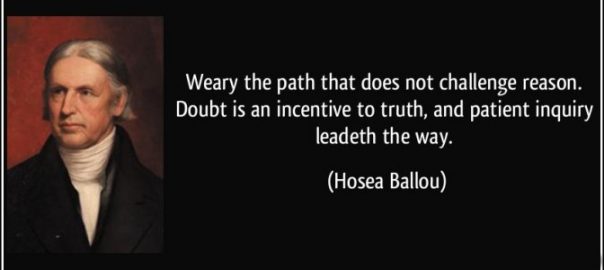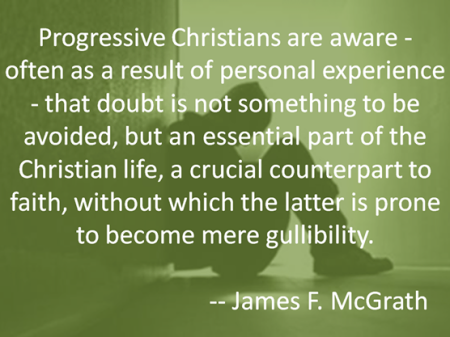If you have been a Christian for any length of time, and even if you’re not what you would call a Christian, you will have had doubts and questions about what you believe, what about God, Jesus, the Bible, suffering, why do wasps even exist, and so on.
In many churches, though, doubt is frowned upon and is seen as the enemy of faith, and so doubt is ‘not allowed’. “We don’t talk about that here, son”. And yet, the man who was most famous for his doubt – the apostle Thomas – had one of the most profound encounters with the risen Christ on record.
In this article, my friend Tim, in his blog ‘Jesus Without Baggage’, begins his series which goes into the subject of doubt and how to face into the honest questions you may have to do with the Bible and the faith, and how leaders and other authority figures fit into that matrix.
This really is a good piece and is well worth reading, as well as being the start of a bigger series that will also be well worth reading…
Dealing with the Fear of Doubt and of Questioning Religious Beliefs We have been Taught
Growing up a fundamentalist, and then 25 years as an evangelical, I witnessed a lot of fear and experienced significant fear myself. These very conservative environments are filled with fear and, to a large extent, are based on fear—fear of God, fear of hell, fear of making a mistake, fear of being wrong, and fear of being rejected by God (and the church).
One must constantly toe the line on God’s many requirements, believe all the right doctrines, and never waver. One of the greatest dangers is doubt; doubt is castigated as being from the devil, and we are warned of the dire consequences of being led astray—punishment in eternal hell fire. Security is found only in accepting tradition passed down as God’s own certain truth from one generation to another to another.
In these circles, having doubt is considered a loss of faith, so it is no surprise that when a believer begins to question their beliefs it often induces a lot of fear. Taking action on those doubts can be even more fearful. But there is NO REASON to fear!
Doubt, Faith, and Authority
Doubt is not the opposite of faith; doubt is the opposite of gullibility. Doubt is not the opposite of faith; doubt is an element of faith. Until we question beliefs we have received, those beliefs are not our own but someone else’s. Until we examine what we have been taught, we are actually putting our faith in some human authority or system. And, often, ‘Do not doubt!’ is a strong part of their message.
Don’t doubt = Don’t think
Appeals are made to the authority of the Bible, but in reality much of what people believe is based on an interpretation of the Bible and not a ‘clear teaching’ of the Bible itself; so our authority is not really the Bible but some particular understanding of the Bible, which is not at all the same thing.
For our beliefs to be our own we must question whether our underlying assumptions are correct and whether our beliefs make sense generally. As followers of Jesus, we must also consider whether they align with his teaching and example.
We must investigate aspects of our belief that just don’t seem right; we must pursue them diligently even if that means we can no longer accept them. This is called critical thinking—where we think for ourselves instead of depending on an outside authority.
‘Do not doubt’ means ‘Do not think’. It means accepting what someone else thinks (or what the group thinks) without questioning whether what they think is valid.
Warnings Against Questioning Our Beliefs
Of course, we are warned against such questioning. We are warned not to heed false prophets or to be tricked by the devil. But doubt means only that we examine our beliefs to see whether they are indeed valid. Do they reflect the most reasonable understanding of reality?
When I was young, a verse in Proverbs 14 guarded me against the danger of questioning my beliefs:
There is a way that appears to be right, but in the end it leads to death.
I didn’t want to be tricked into following the wrong path—one that led to death. This verse was very effective against my harboring doubt until one day I realized that it could apply to any ‘way’–even my current belief system. I was shaken. It was only then that I even considered there might be flaws in my beliefs.
But as I began to embrace critical thinking I was afraid, sometimes intensely afraid, because I had been warned to not fall into the dangerous error of questioning my beliefs. I was afraid God would punish me for my doubts even to the point of sending me to eternal burning hell. This is a tremendous deterrent to doubt—and independent thinking!
I feared I might be making a huge mistake, that the conclusions of my quest might be wrong, and that I would be rejected by God. But these fears were unfounded. No one should fear honest doubts and questions about beliefs they have been taught.
Discovering Errors in the Religious Baggage I Inherited from Others
As I began to question my inherited beliefs, it is interesting that I asked some of the same questions many other people from such conservative circles ask:
- Is God angry, harsh, and vindictive or a loving Father as Jesus tells us?
- Does God want us to follow long lists of religious rules (commandments) or to follow Jesus and his principles of the kingdom and of loving others?
- Does a loving God really send people to eternal burning hell, and does the Bible even teach such a thing?
- Should we assume the Bible is God’s very word throughout or read it as a record of how people understood God within their own eras, cultures, and limited grasp of God’s character?
- Does a loving God exclude and reject some people such as gays, and does the Bible even suggest this?
These are not all the possible questions, of course, but are some of the most common ones. And I think there is a reason for this—these beliefs, passed down in some traditions, are seriously mistaken and lead to baggage, bondage, and erroneous understandings of God, Jesus, and the Bible; and at some point they just don’t feel right. I bet you have wondered about some of these questions—perhaps fearfully.
Faith in these and other mistaken beliefs, based on someone else’s word and understanding, is not true faith but a dependence on human authority. And once we realize this fear vanishes.
Click the graphic below to go to the original article:


